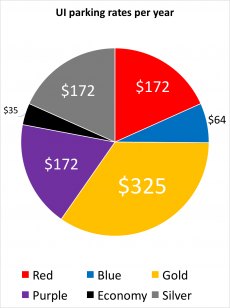
Grayson Hughbanks
There are no simple solutions to parking problems on the University of Idaho campus.
According to an email received by students from Parking and Transportation Services (PTS). There are three proposed changes labeled under “(fiscal year) 2019 changes” that would take effect July 9 and one additional change labeled under “FY20 changes” that would take effect July 1. These changes would be in conjunction with efforts of the university urging students, particularly freshmen, to use alternative modes of transportation.
The fiscal year 2019 changes could create a new Orange permit zone priced between Gold and Red. For $250, Orange permits would also allow daytime parking in Red and Blue lots.
The changes purpose increasing Gold permits by $13, increasing residential parking permits (Silver, Purple and Green lots) by $24 and implementing a “bike share program roll-out” for summer 2018.
The fiscal year 2020 changes dictate Gold Lot 35 at Student Health Services be converted into an hourly pay parking lot.
Robert Mitchell, a UI parking information specialist, said there is no quick curecure to parking issues on campus. Although a lot of public opinion points toward building new parking structures, Mitchell said new structures are not the solution people want them to be.
“Let’s say we did drop a 150-space parking garage in the Tower lawn, which is where everybody says to stick a garage,” Mitchell said. “Whether you work or you’re getting out of class, everybody gets off around the same time. So, even if money was no object, and we dropped parking garages throughout campus, when it comes time to exit the parking garage, our surface streets are really no more than walkways in terms of width and grading. So, what you’d end up with, literally, would be gridlock.”
Mitchell said the campus was designed to easily commute on foot and there is only so much expansion that can be done in the area of real estate owned by the university. He said that is not the intent of the university

Grayson Hughbanks
“We’re dealing with a finite campus that was built to be walkable and bikeable,” Mitchell said. “We don’t want to phase (personal vehicles) out completely. What we want to do is make it not only possible, but convenient and affordable for folks who don’t need to bring their personal vehicles to get around and do what they want to do.”
Mitchell said although there is a proposed new Orange parking permit, there are no new parking lots being added on campus. Instead, various Red lots located near the core of campus would turn Orange.
“It is a zero-sum game,” Mitchell said “It’s the same real estate. What we are trying to do is better utilize that real estate.”
It’s been seven years since the university has raised parking rates, according to Mitchell. Rising university expenses such as parking lot upkeep have led to the debate of raising parking pass prices.
He said PTS is focusing on restructuring the way residential students think about having a vehicle on campus.
Mitchell advocated for the bike-share program, saying the bike-share system will be convenient for students.
“Within the parameters of the area, you can ride your bike anywhere, park it in a safe spot and go about your business. The next person opens up their app, sees where the closest bikes are, they pay for it with their phone and off they go,” he said.
Although many universities across the U.S. don’t permit freshmen to own a vehicle, Mitchell said UI has been very weary of that option, considering the university’s location and attempts to enroll more students.
“It’s difficult, one of our main goals at UI is to grow enrollment, and so something like that we would pitch to recruitment, it would have to be weighed in on and it would take time to implement,” he said. “Before anything like that would happen, we need to take a look at universities that implemented that rule and see how that impacted recruitment.”
Mitchell said regardless of what changes need to be implemented, the key to a less congested campus is changing the way people view alternative transportation options.
“If the mindset and the current alternative transportation infrastructure do not change, then yes, it’ll be gridlock,” Mitchell said. “This isn’t going to work without a conversation. It has to be a cooperation, it has to be a dialogue, and it has to be looking for the common goal of success for the university and success for students.”
Abby Childress, a freshman biochemistry, microbiology and Spanish major said her biggest frustration with parking is the overselling of Silver permits and the lack of parking restrictions on the weekends.
“They don’t check parking passes on the weekend, so a lot of the time there will be people who don’t have parking passes in all the parking lots,” Childress said. “Half the time it’s not an issue because there aren’t enough people here on the weekends, but when there is a basketball or a football game every lot is full. Then, none of the people paying for a permit can park.”
Childress said she believes the university should find a way to expand and construct new parking structures on campus.
Childress also said she doesn’t believe people will stop bringing personal vehicles because of Moscow’s location and other personal reasons.
“I don’t think it’s particularly logical to assume people aren’t going to bring their cars,” Childress said. “Especially not when you’re two hours from pretty much any other major city. And, I am not a huge fan of them raising rates when they already have a monopoly on parking.”
Andrew Ward can be reached at [email protected] or on Twitter @WardOfTheWorlds
